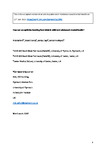How can we optimise learning from trials in child and adolescent mental health?
| dc.contributor.author | Axford, Nick | |
| dc.contributor.author | Berry, V | |
| dc.contributor.author | Lloyd, J | |
| dc.contributor.author | Wyatt, K | |
| dc.date.accessioned | 2022-08-08T16:46:49Z | |
| dc.date.issued | 2022-07-12 | |
| dc.identifier.issn | 1362-0347 | |
| dc.identifier.issn | 1468-960X | |
| dc.identifier.uri | http://hdl.handle.net/10026.1/19519 | |
| dc.description.abstract |
Improving child and adolescent mental health requires the careful development and rigorous testing of interventions and delivery methods. This includes universal school-based mindfulness training, evaluated in the My Resilience in Adolescence (MYRIAD) trial reported in this special edition. While discovering effective interventions through randomised controlled trials is our ultimate aim, null or negative results can and should play an important role in progressing our understanding of what works. Unfortunately, alongside publication bias there can be a tendency to ignore, spin or unfairly undermine disappointing findings. This creates research waste that can increase risk and reduce benefits for future service users. We advocate several practices to help optimise learning from all trials, whatever the results: stronger intervention design reduces the likelihood of foreseeable null or negative results; an evidence-informed conceptual map of the subject area assists with understanding how results contribute to the knowledge base; mixed methods trial designs aid explanation of outcome results; various open science practices support the dispassionate analysis of data and transparent reporting of trial findings; and preparation for null or negative results helps to temper stakeholder expectations and increase understanding of why we conduct trials in the first place. To embed these practices, research funders must be willing to pay for pilot studies and ‘thicker’ trials, and publishers should judge trials according to their conduct and not their outcome. MYRIAD is an exemplar of how to design, conduct and report a trial to optimise learning, with important implications for practice. | |
| dc.format.extent | 93-95 | |
| dc.format.medium | Print-Electronic | |
| dc.language | en | |
| dc.language.iso | en | |
| dc.publisher | BMJ Publishing Group | |
| dc.subject | Child & adolescent psychiatry | |
| dc.title | How can we optimise learning from trials in child and adolescent mental health? | |
| dc.type | journal-article | |
| dc.type | Journal Article | |
| plymouth.author-url | https://www.webofscience.com/api/gateway?GWVersion=2&SrcApp=PARTNER_APP&SrcAuth=LinksAMR&KeyUT=WOS:000835365400001&DestLinkType=FullRecord&DestApp=ALL_WOS&UsrCustomerID=11bb513d99f797142bcfeffcc58ea008 | |
| plymouth.issue | 3 | |
| plymouth.volume | 25 | |
| plymouth.publication-status | Published | |
| plymouth.journal | Evidence-Based Mental Health | |
| dc.identifier.doi | 10.1136/ebmental-2022-300500 | |
| plymouth.organisational-group | /Plymouth | |
| plymouth.organisational-group | /Plymouth/Faculty of Health | |
| plymouth.organisational-group | /Plymouth/Faculty of Health/Peninsula Medical School | |
| plymouth.organisational-group | /Plymouth/REF 2021 Researchers by UoA | |
| plymouth.organisational-group | /Plymouth/REF 2021 Researchers by UoA/UoA03 Allied Health Professions, Dentistry, Nursing and Pharmacy | |
| plymouth.organisational-group | /Plymouth/Research Groups | |
| plymouth.organisational-group | /Plymouth/Research Groups/FoH - Community and Primary Care | |
| plymouth.organisational-group | /Plymouth/Research Groups/Plymouth Institute of Health and Care Research (PIHR) | |
| plymouth.organisational-group | /Plymouth/Users by role | |
| plymouth.organisational-group | /Plymouth/Users by role/Academics | |
| dc.publisher.place | England | |
| dcterms.dateAccepted | 2022-06-15 | |
| dc.rights.embargodate | 2022-8-10 | |
| dc.identifier.eissn | 1468-960X | |
| rioxxterms.versionofrecord | 10.1136/ebmental-2022-300500 | |
| rioxxterms.licenseref.uri | http://www.rioxx.net/licenses/all-rights-reserved | |
| rioxxterms.licenseref.startdate | 2022-07-12 | |
| rioxxterms.type | Journal Article/Review |


